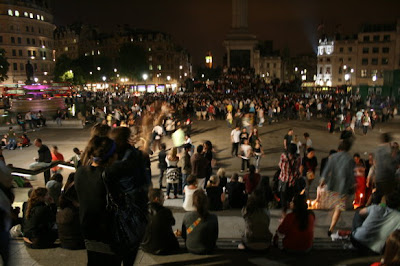
Iza Genzken at the Whitechapel Gallery
On the other hand, I am also not interested in a pretty painting for the sake of being a pretty painting. I want substance. I craved it after years of technical classes. Visually I want both a balance of technical and a breaking of all the traditional rules (see artist Justin Mortimer). Theoretically, I want some reason for making the work, whether technical (like experimenting with surface) or experiential (like documenting lives in Liberia), or philosophical (like any artist's current Artist Statement).

Justin Mortimer's painting Family Plot
I am more and more interested in delving into themes and ideas when creating work. I want to do a series related to the ever present Facebook in relation to identity. Wow, I am sounding remotely art-speak. I think where my failing comes in are from a lack of understanding, interest, and involvement in current art theory and its consequent practice. It depresses me when it seems so far away from what I am aiming to do, which is paint. Theory often seems overly complex and caught in the cycles of thinking that don't free me as an artist. It was summed up in an email I received back from a friend who is both artist and curator, after I had sent him some job openings for curating and involvement at a more theoretical level in different art venues. I added that I didn't have enough knowledge in art to pursue them myself. To which he emailed back "but you would be an excellent painting instructor in the right situation." And suddenly it dawned on me that is precisely what my strength is. I am a painter. I like the challenge of the technical. I could think of quite a number of very successful artists (in the world of art) who built a career based primarily (but importantly, not entirely) on using that particular strength. It is the opposite of growth to feel discouraged, lost, and inadequate when trying to move forward in anything creative. I may be in a slightly different camp than my theoretical peers, but at least I now know exactly what i need to do.










